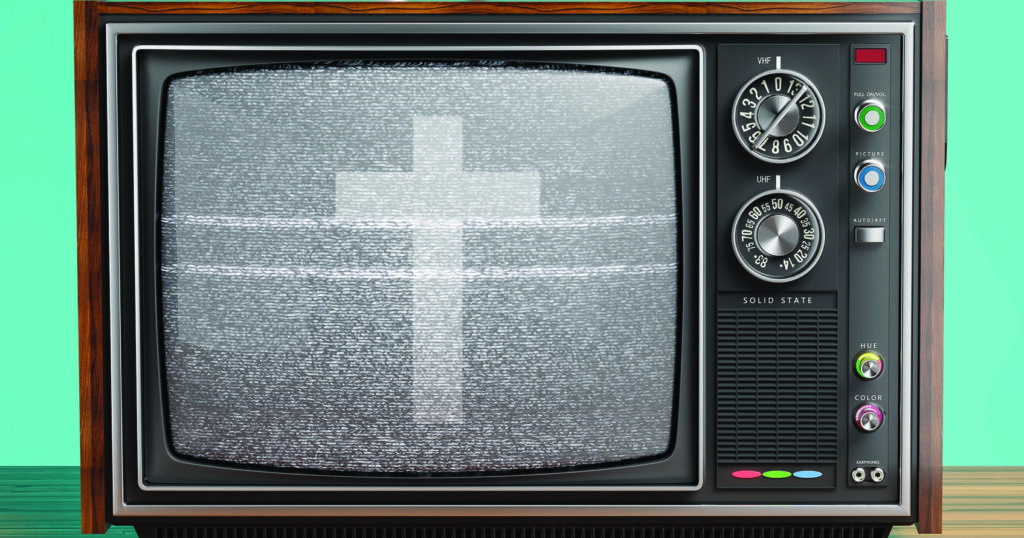By Andrew Egger
Throughout the month of September, The Lutheran Witness will be sharing articles from our August 2020 print issue on topics related to religion and politics. Stay tuned to LW online to follow along.
As Christians, we live as strangers even in our own land. We live in a tension between being a Christian and an American. Our aims and the country’s aims will sometimes diverge. But God also calls us to work for the good of our neighbors, as far as we are able. In America, where citizens participate in the task of bringing about just government, Christians have a vocation to participate in the political life of the nation.
Participation in political life requires us to remain informed about current affairs. This task immediately confronts us with a problem. The extreme political and media fragmentation of our time undermines any shared national narratives. Instead, a cacophony of competing political narratives barrages us from all sides, and a partisan agenda seems to lurk furtively behind the simplest statements of fact.
This mess makes the vocation to participate in political life more complicated, but it does not excuse us from the task of fulfilling it. A defensive crouch is common, but insufficient. We cannot fulfill our vocation to our neighbor by proclaiming, “I don’t pay much attention to the news; it’s all biased anyway.”
Here are a few things to keep in mind as you strive to keep yourself informed.
Who can you trust?
The news industry believes it can serve as a pure conduit for information: The reporter captures a news event and transmits it unblemished to the reading public. The reality is far messier. The reporter, the public figure and the reader are all fallen sinners, subject to fallible judgments and blinkered perspectives. Some reporters take greater pains to be as fair as possible, but even the most conscientious news reporting contains elements of bias.
Yet the presence of bias does not make a story useless. A reporter’s political bias may affect which facts are included or emphasized, but the facts themselves will generally be reliable. While errors happen, cases of outright fabrication are rare and disciplined within the journalism industry.
Informed, not angry
Rather than “How can I avoid biased journalism,” we might ask: “How can I prioritize sources that keep me informed, rather than ones that make and keep me mad?”
While we tend to think of the media as a single entity with one set of motivations and values, business models and motivations vary widely across the industry. Most major media entities exist to make money, but the way they go about that varies widely too.
To paint in broad strokes: Cable news is designed to hold your attention and keep it in
a headlock as long as possible. It prioritizes the sensational and the sleazy. Internet-only news is often the same. Clickbait headlines, hot takes and opinion pieces bounce wildly around social media; this is good for the news organization’s bottom line but not for keeping you informed. To keep abreast of national news, you could do a lot worse than picking up a subscription to a daily paper.
Once you have established that baseline, explicitly ideological publications can help put the news in context. But remember, a publication that shares your biases does not mean that it deserves your trust. As conservatives have begun to see “mainstream” news outlets as less reliable, a cottage industry of news charlatans and snake-oil salesmen has sprung up to monetize that distrust. Any outlet that tries to convince you it is the sole voice of truth should be approached with extreme caution.
In all of this, strive to achieve two things. First, supply yourself with a media diet that will help you stay generally abreast of current events. That helps you exercise your vocation as an American citizen. Second, bear in mind that this is only a secondary vocation. Our first loyalty belongs not to any political or media team but to Christ and His church.
Bespoke news distributors
One other point is worth making here. When we interact with news media, we must bear in mind more than our duty to the nation. The way we use media also affects the much smaller and more concrete community of our own neighbors.
In the internet age, many of us are not just news consumers anymore. If you use social media to discuss current events, then you also function as a tiny, bespoke news distributor to your family and friends. The content you share will shape the way your neighbor views the world. This brings with it another vocation and another set of responsibilities altogether.
When you share something one of your friends posted, you are relying on your friend’s credibility. But the people with whom you shared it won’t see it that way. They read what you share because they trust you. Do not betray that trust by feeding them things you do not know to be true. Social media tends to amplify the worst aspects of the news.
But you can choose not to be part of the problem. Do not spread misinformation. Strive to behave with grace. You will be miles ahead of the curve.
The ultimate struggle
The biggest problem with the news media is not political bias, unreliable facts or overly sensationalized news. The biggest problem is its view of the world: A ceaseless, all-encompassing, life-or-death struggle between radically opposed political forces. From The New York Times to Fox News to the internet’s fringiest blogs, they tempt the reader to dive into that struggle as though it is the most important fight there is.
As the children of God, we know the ultimate struggle is not between flesh and blood (Eph. 6:12). The ultimate struggle does not occur between the weather report and the next sitcom but against the “spiritual forces of evil in the heavenly places.” While the fights among political parties and media outlets continue interminably, Christ has already won the final struggle against the devil. And regardless of the news cycle, Christ gives this victory to you.
In light of this victory, your task is straightforward: Stay abreast of the political struggle while rejecting its self-proclaimed status as the ultimate struggle. To exist in this tension is not easy. But it is part of the tension Christ calls us to endure in our daily lives: to forsake the world while living in it, to be as wise as serpents without ceasing to be innocent as doves.
This article first appeared in the August 2020 print issue of The Lutheran Witness.
Cover image: LCMS Communications/Erik M. Lunsford





